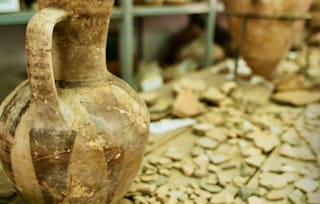The Arch of Titus: Rome and the Menorah explores one of the most significant Roman monuments to survive from antiquity, from the perspectives of Roman, Jewish and later Christian history and art. The Arch of Titus commemorates the destruction of Jerusalem by the emperor Titus in 70 CE, an event of pivotal importance for the history of the Roman Empire, of Judaism, of Christianity and of modern nationalism.

Arch of Titus: Rome and the Menorah
Seize the savings! Get 40% off 3 months of Coursera Plus and full access to thousands of courses.

123 reviews
Details to know

Add to your LinkedIn profile
See how employees at top companies are mastering in-demand skills

There are 6 modules in this course
This module introduces the Arch of Titus and the larger themes of the course. Students will begin to view the Arch from the perspectives of Roman and Jewish history, of the victors and the vanquished, and the continuing history of this artifact. They will be sensitized to the presence of imagery related to the Arch in the larger culture, and be able to identity some of that imagery.
What's included
8 videos1 reading1 peer review
This module explores the Arch of Titus as an artifact. Students will learn to look closely at this and other historical monuments in order to draw out the meanings of its iconography. They will see the Arch and especially its carved relief panels through selected refracting lenses.
What's included
8 videos1 assignment
Roman and Talmudic sources on Titus's triumphal parade in 71 CE will be the focus of this module. Students will read these ancient texts critically and assess the historical value for understanding the Arch and its later reception.
What's included
4 videos1 peer review
Students will explore Jewish and Christian perspectives of the Arch and be able to explain how these perceptions affected their experience and interpretation of this artifact. Conversations with scholars and museum "visits" demonstrate a broad range of contemporary perspectives on the Arch and the continued significance of its iconography.
What's included
13 videos1 peer review
We will explore the ways that moderns have viewed and used the Arch, through the close reading of primary visual and literary sources. "Fieldtrips" and conversations contextualize the search for Arch imagery in our world, and demonstrate ways to recognize this iconography. Students will write a narrative of the Arch in modern times based upon primary literary sources.
What's included
9 videos1 peer review
Recent advances in the study of the original color, polychromy, of ancient Roman art will be presented. Students will learn the reasons for this rethinking of ancient art, and apply this learning to their own restorations of the polychrome of the Arch of Titus menorah panel.
What's included
8 videos3 readings1 peer review
Instructor

Offered by
Explore more from History
 Status: Preview
Status: PreviewTel Aviv University
 Status: Preview
Status: PreviewUniversity of Arizona
- Status: Preview
Sapienza University of Rome
 Status: Free
Status: Free
Why people choose Coursera for their career

Felipe M.

Jennifer J.

Larry W.

Chaitanya A.
Learner reviews
- 5 stars
73.17%
- 4 stars
13.82%
- 3 stars
8.13%
- 2 stars
3.25%
- 1 star
1.62%
Showing 3 of 123
Reviewed on Feb 2, 2020
Arch of Titus give me deeper understanding about Roman architecture, Hebrew historical and sociological context after the destruction of Jerusalem circa 70 AD
Reviewed on Aug 22, 2016
I rate this course as excellent. It was fascinating and I enjoyed the detailed study. I also enjoyed the beautiful filming of the various locations and especially the Arch of Titus itself
Reviewed on Oct 8, 2020
Fabulous course I learnt so much more about the symbolics behind the carvings on the Arch

Open new doors with Coursera Plus
Unlimited access to 10,000+ world-class courses, hands-on projects, and job-ready certificate programs - all included in your subscription
Advance your career with an online degree
Earn a degree from world-class universities - 100% online
Join over 3,400 global companies that choose Coursera for Business
Upskill your employees to excel in the digital economy
Frequently asked questions
To access the course materials, assignments and to earn a Certificate, you will need to purchase the Certificate experience when you enroll in a course. You can try a Free Trial instead, or apply for Financial Aid. The course may offer 'Full Course, No Certificate' instead. This option lets you see all course materials, submit required assessments, and get a final grade. This also means that you will not be able to purchase a Certificate experience.
When you purchase a Certificate you get access to all course materials, including graded assignments. Upon completing the course, your electronic Certificate will be added to your Accomplishments page - from there, you can print your Certificate or add it to your LinkedIn profile.
Yes. In select learning programs, you can apply for financial aid or a scholarship if you can’t afford the enrollment fee. If fin aid or scholarship is available for your learning program selection, you’ll find a link to apply on the description page.
More questions
Financial aid available,
¹ Some assignments in this course are AI-graded. For these assignments, your data will be used in accordance with Coursera's Privacy Notice.


